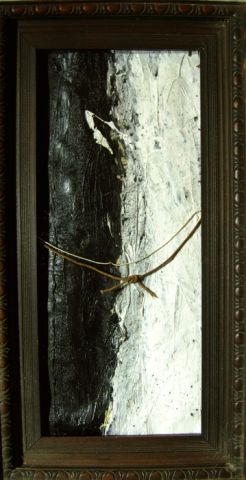We are having a very interesting discussion about intuition (see David Minton’s Dead and Dying Flowers post #50, my post #4 and the comments attached) in addition to the discussion of post-modernism in the two posts mentioned above, which has been commented on by Jon Bowen (see his blog Before Hindsight post #28 and the attached comments).
David Minton says this about intuition: as I see it, intuition as in the ‘intuitive leap’ intuitive response, judgement and so on is what connects past experience with current events (like making an artwork). It is not a process which reveals its workings in advance, but can be seen to have been appropriate in retrospect. Something like an ‘impulsive leap’ would be more akin to a guess. Impulse does not connect with experience in the same way as intuition. An impulsive act carries with it the implication that it lacks insight; success is a product of good fortune, whereas an intuitive leap is grounded in insight; success follows from an intuitive sense of direction.??
And Jon Bowen adds this: What David is saying about Intuition and Impulse reminds me of some psychological work done with trance: When trance is induced lightly, the subject sees abstract patterns and motions, the nature of which are common across the whole of humanity. However, as trance deepens, the subject has dream-like visions, which involve a combination of real-life things, and the abstract material. The visions are based on experience: A Masai tribesperson will see wildebeest, impala, woodlands, etc., whereas a Londoner will see neon signs, motor vehicles, buildings, computer screens, etc. Is Impulse as direct human reaction akin to the processes of light trance, while intuition as an insightful product of experience is akin to the processes of deep trance?
Both very good comments ending in very good questions I think.
What is intuition, how does it work and why do we need it? And perhaps more importantly, are we still paying attention to it in art? I’m not sure there is a great deal of intuition in post-modernism, it seems to be out of fashion. And perhaps rightly so after the extreme emotion of Abstract Expressionism, the cooler head-space of logic and intellectualism (I’m thinking of minimalism and conceptualism) prevailed. But are we missing the interaction with the unknown, the unpredictable?
I absolutely believe artists still make art on those terms, intuitively, relating and reacting to chance, but I question how visible it is in the work produced. Is this perhaps what we dislike or feel discontented with in post-modernism? Are we missing a bit of mystery?
Intuition is a very mysterious thing. I’ve never know why I have it or how it works, but I know most definitely that I need it. And, I know that I can trust it, whereas my impulses always get me into trouble. I can explain it in no other way than when I act on impulse, it feels wrong and I feel uncertain. When I act on intuition, it feels right as if some information I’ve needed is being given in time with my actions.
As for Jon’s description of trance above, it makes me chuckle, not at Jon’s words but at myself. His description describes the workings inside my head in my waking state. If asked, my husband would probably agree that I walk around in a trance most of the time! But I’m just looking at the pictures in my head!!

